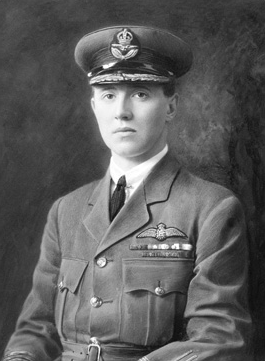William George Barker
As stated in the following London Gazette citation, William George Barker is a recipient of the Victoria Cross. This medal is awarded for the most conspicuous bravery, a daring or pre-eminent act of valour, or self-sacrifice or extreme devotion to duty in the presence of the enemy.
Victoria Cross - First World War, 1914-1918

William George Barker was born in Dauphin, Manitoba on 3 November 1894. During the First World War, Barker enlisted as an infantryman, but later transferred to the Royal Flying Corps (from 1 April 1918, the Royal Air Force).
A superb fighter pilot, he was responsible for the destruction of 50 enemy aircraft.
On 27 October 1918, while flying alone over the Forêt de Mormal in France on his way back to England, Major Barker engaged successive formations of German aircraft. After shooting down an enemy two-seater, he was attacked by a fighter and suffered a wound in his thigh. Barker then found himself surrounded by enemy fighters and was again severely wounded. Nevertheless, despite his wounds, he succeeded in bringing down three more German aircraft before crashing behind his own lines. For his conduct on this occasion, Major Barker was awarded the Victoria Cross.
Barker was killed in a flying accident at Rockcliffe airport, near Ottawa, on 12 March 1930. In addition to the Victoria Cross, for his wartime service Barker received the Distinguished Service Order with one bar, and the Military Cross with two bars.
Citation
“On the morning of the 27th October, 1918, this officer observed an enemy two-seater over the Fôret de Mormal. He attacked this machine, and after a short burst it broke up in the air. At the same time a Fokker biplane attacked him, and he was wounded in the right thigh, but managed, despite this, to shoot down the enemy aeroplane in flames.
He then found himself in the middle of a large formation of Fokkers, who attacked him from all directions; and was again severely wounded in the left thigh; but succeeded in driving down two of the enemy in a spin.
He lost consciousness after this, and his machine fell out of control. On recovery he found himself being again attacked heavily by a large formation, and singling out one machine, he deliberately charged and drove it down in flames.
During this fight his left elbow was shattered, and he again fainted, and on regaining consciousness he found himself still being attacked, but, notwithstanding that he was now severely wounded in both legs and his left arm shattered, he dived on the nearest machine and shot it down in flames.
Being greatly exhausted, he dived out of the fight to regain our lines, but was met by another formation, which attacked and endeavoured to cut him off, but after a hard fight he succeeded in breaking up this formation and reached our lines, where he crashed on landing.
This combat, in which Major Barker destroyed four enemy machines (three of them in flames), brought his total successes up to fifty enemy machines destroyed, and is a notable example of the exceptional bravery and disregard which this very gallant officer has always displayed throughout his distinguished career.
Major Barker was awarded the Military Cross on 10th January, 1917; first Bar on 18th July, 1917; the Distinguished Service Order on 18th February, 1918; second Bar to Military Cross on 16th September, 1918; and Bar to Distinguished Service Order on 2nd November, 1918.”